Why Distance Learning? Podcast
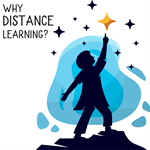 In the Why Distance Learning? podcast three seasoned education professionals and their diverse range of guests seek to dispel myths about virtual learning to show it is a promising tool that can improve all our lives. Get episodes below.
In the Why Distance Learning? podcast three seasoned education professionals and their diverse range of guests seek to dispel myths about virtual learning to show it is a promising tool that can improve all our lives. Get episodes below.
If you have experienced any troubles with virtual learning, let us know about it here so we can talk through troubleshoots live with different virtual educators!
Become part of a global learning network - Sign up for FREE today!
Free Membership
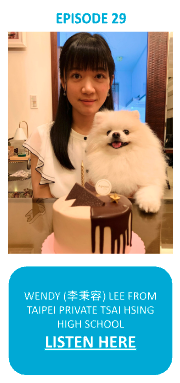
We welcome Wendy Lee from Tsai Hsing School in Taipei, Taiwan who discusses the multifaceted roles of local teachers in a global distance learning language program called Learning Live. She highlights the challenges and responsibilities these educators face daily, emphasizing their need to be detail-oriented, capable of multitasking, and flexible to handle the unexpected. Key responsibilities include managing student behavior, ensuring comprehension in a non-native language (English), facilitating group projects, and providing on-site technical support. Wendy explains that the program collaborates with teachers from Banyan Global Learning - who provide the lead teachers at a distance - to develop a curriculum that not only teaches English but also integrates cultural awareness.
The conversation also touches on cultural sensitivity in teaching, particularly around topics like gender equality. Wendy shares an instance where categorizing adjectives by gender in class proved challenging for Taiwanese students due to cultural differences in gender perception. This leads to discussions on how to redesign activities to better address and teach gender equality, highlighting the importance of cultural context in educational content.
Wendy advocates for strong communication and cooperation between local and distance learning teachers to enrich students' learning experiences and foster global perspectives. She stresses the long-term benefits of understanding and empathy in educational settings, which can significantly impact students' development and worldview.
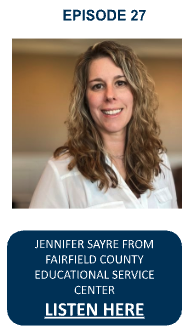
In this episode, the WDL crew welcomes Jen Sayre, Director of Applied Technology at Fairfield County ESC, Ohio. They delve into the essence of high-quality online learning experiences and the genesis of InnevAto EDU, a comprehensive online course catalog for grades 6-12. Jen narrates inspiring student stories who leveraged online learning to chase their dreams, underscoring the urgency to reconceptualize educational time and space. They also discuss InnevAto's collaboration with CareerTech, aiming to offer career-specific electives alongside practical experiences.
Throughout the conversation, Jen underscores the critical needs of teachers and course developers in adapting to online education. She stresses the significance of integrating SEL, ADA compliance, and DEI principles into digital learning environments. Jen advocates for robust training for educators, emphasizing web accessibility and the adept incorporation of SEL and DEI into online curricula. Highlighting the customized nature of online assessments, she calls for a fresh approach towards educational logistics. Jen's insights underline the unparalleled accessibility and adaptability of online learning, framing it as a cornerstone for future educational endeavors.
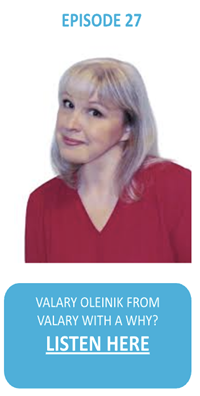
Valary Oleinik describes herself as part artist, part geek, and wholly dedicated to enhancing live virtual learning experiences. Her unique approach, blending curiosity, gameful experiences, and technology, positions her as a key influencer and innovator in the field. Valary's dedication to breaking traditional education molds is evident as she explains her methodologies for making distance learning more engaging and effective. By leveraging her "MacGyver mindset," she encourages educators to utilize available resources creatively and to rethink their approaches to teaching and learning in virtual environments. Her philosophy emphasizes the importance of curiosity, creativity, and the use of technology to foster engaging learning experiences that cater to diverse learning journeys.
Throughout the conversation, Valary shares anecdotes and examples from her work, including her innovative "in and out of the box" thinking exercises and her commitment to volunteerism within the learning community, particularly through her roles at the US Distance Learning Association (USDLA). Her strategies for overcoming challenges in distance education, such as fostering engagement and addressing the fears and reservations of educators new to the virtual format, resonate with the overarching theme of the podcast. Valary's insights into gamification, the power of choice in learning, and the necessity of adapting to learners' needs underscore the transformative possibilities that distance learning offers. The discussion serves as an inspiration for educators seeking to navigate and excel in the realm of live virtual learning.
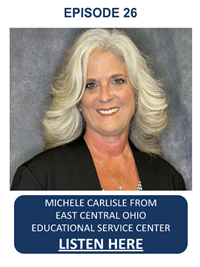
In this episode, Seth and Allyson interview Michelle Carlisle, an expert, experienced distance learning educator. They discuss Michele's world language program in Ohio, which offers several languages that would not be available were it not for live virtual instruction. Michelle shares the history and development of the program, as well as the challenges and successes of teaching languages remotely. They also explore the importance of building relationships in distance learning and how teachers can create connections with their students. Finally, they discuss Go Learn, a platform that allows school districts to offer and access additional courses through live virtual instruction. The conversation explores the implementation of hybrid learning models and the importance of preparing students for the future workforce. It also discusses innovative teaching methods and the benefits of distance learning.
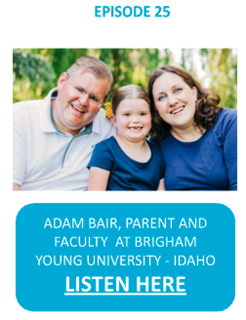
In this episode, the team interviews Adam Bair, a parent whose daughter participates in CILC's Community of Learning events. Adam shares his journey and the impact of distance learning on the education of his daughter, a child who is deaf. They discuss the importance of exposure to new content for children with hearing loss and the impact of using American Sign Language (ASL) on learning methods and outcomes. Adam also highlights the evolution of accessibility features in video conferencing and the funding opportunities available for accessibility initiatives. The conversation emphasizes the power of distance learning in providing equitable access to education.
Distance learning provides access to locations and experiences that may not be possible otherwise. ASL interpretation and accessibility features in video conferencing have improved, making distance learning more inclusive.Distance learning allows for exposure to new content and concepts, which is crucial for deaf children's learning. ASL is a conceptual language that conveys ideas rather than a direct word-for-word translation.
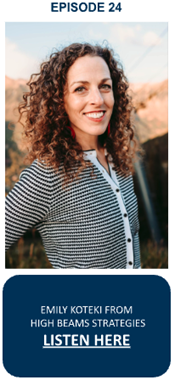
This episode's guest is Emily Koteki, the principal and founder of High Beam Strategies. With a wealth of experience in online learning, including crafting audio tours and developing apps for museums, Emily shares her expertise on creating compelling digital learning experiences. Drawing from her work with clients and her publication 'The Distance Learning Workbook,' she emphasizes the importance of building a robust foundation for distance learning initiatives. Through a detailed discussion, Emily addresses the challenges and opportunities of engaging digital visitors, expanding museum audiences, and innovating revenue models through digital platforms. She underscores the significance of distance learning in extending the reach of museums beyond local communities, fostering global connections, and democratizing access to cultural education.
The episode further explores the nuances of professional development in the digital age, pondering on the design differences between asynchronous and synchronous sessions and strategies to enhance teacher engagement with professional development. Emily's insights into creating live virtual field trips and her model for virtual field trip creation are particularly compelling, offering listeners a blueprint for inspiring and implementing digital learning projects. The conversation culminates in a playful yet enlightening round of Museum Buzzwords Alphabet, alongside a reflective question on the overarching importance of distance learning. This episode is a treasure trove of knowledge for educators, museum professionals, and anyone interested in the intersection of culture, education, and technology, providing actionable strategies and thought-provoking perspectives on the future of digital learning in museums.
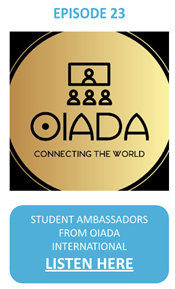
In this episode of the podcast, our hosts delve into the world of distance learning with a focus on the experiences of students and teachers from Ghana. The episode features engaging interviews with three inspiring students: Shelter, a high school student aspiring to be an obstetrician; Annabel, a junior high student with dreams of becoming a journalist; and Rashida, who aims to be a fashion designer. Each student shares their unique 'golden moments' of using live video conferencing in their education, highlighting the impact of distance learning on their personal and academic growth.
The conversation also invites Godfred, a dedicated educator and facilitator at Osagyefo Leadership International School in Accra, to share his perspective. His passion for making learning fun and accessible shines through as he discusses the transformative role of distance learning in providing quality education and the flexibility it offers. A key part of the discussion revolves around how distance learning enables these students and teachers to share and correct misconceptions about Ghanaian culture. They explore the collaborative process of developing workshops that showcase different elements of their culture, fostering a deeper understanding and appreciation among global audiences.The guests express their excitement and fascination with these tools, emphasizing how they enhance the learning experience.

In this episode, Tracey Rowley, the Senior Director of Instructional Technology and Online Education at the Tucson Unified School District, delves into the transformative role of virtual field trips in education. Tracey highlights the distinctive experiences these trips offer, such as a golden moment she describes with a virtual trip to the Smithsonian, which particularly resonated with English Language Learners through live interactions with experts. She emphasizes the difference between virtual field trips and mere website visits, underscoring the value of active engagement with field experts. Tracey also addresses the challenges in implementing these innovative teaching methods, discussing the protocols for distance learning developed in Tucson and how she supports teachers through resources, professional development, and technology. The podcast not only showcases her role in the classroom and her advocacy for practical technology use but also her efforts in building community connections and balancing asynchronous and synchronous learning experiences.
The episode further explores how virtual field trips can break down geographical, economic, social, and cultural barriers, providing equitable access to educational opportunities. Tracey shares her insights on the importance of teachers trying new technologies, like esports, and the role of instructional technology in enhancing learning. She speaks about her involvement in helping national parks design their virtual field trips and the technical aspects of integrating these experiences into the classroom. The discussion also covers how she differentiates between fleeting tech trends and lasting tools, and the strategies she employs to encourage teachers to innovate and connect with each other.
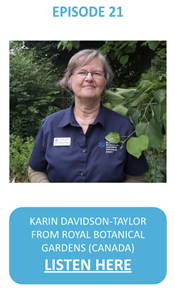
Dive into the captivating world of live virtual learning with our latest episode featuring Karin Davidson-Taylor, a seasoned School Programs Officer at the Royal Botanical Gardens in Hamilton, Ontario. With her rich background of over 17 years in teaching, Karin has transformed RBG into a hub for interactive virtual learning, reaching audiences across North America and beyond.
In this episode, Karin shares her inspiring journey and the golden moments of using live video in education. She tackles the persistent challenges of distance learning and reveals how she makes the wonders of plants come alive through a screen.
Explore how Karin balances in-studio and garden programs, and discover her unique approach to customizing content for diverse international standards. Delve into the art of making plants exciting over live video and learn about her innovative use of document cameras to zoom in on the natural world.
We also discuss the importance of plants in our daily lives and their role in the environment, and how Karin addresses the common belief that nature is best learned outdoors.
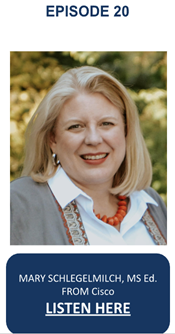
In this episode, we delve into the world of live virtual learning with our special guest, Mary Schlegelmilch, an expert in distance learning (DL) and a former classroom teacher who now works on a broader scale in the field. Mary shares her journey from being deeply involved in the classroom to addressing the challenges of DL at a systemic level. She discusses the evolution of her role, where her focus has shifted from hands-on classroom teaching to strategic planning for the widespread adoption of DL technologies. Mary, now responsible for preparing all K-12 schools in the nation to use Cisco as a solution for DL, sheds light on the hurdles schools face in adopting DL and how the pandemic has reshaped the landscape of distance education. Her insights are not only profound but also showcase the transformative power of DL in modern education.
The episode is not just an interview but a treasure trove of information and inspiration for educators and content providers engaged in live virtual learning. Mary's story is a testament to the potential of DL in addressing current educational challenges, such as the teacher shortage, through innovative solutions like the hybrid logistics project. This project exemplifies a new, hybrid model of education where active learning and great teaching converge. Moreover, Mary's emphasis on teaching students how to find and discern information, rather than just imparting knowledge, highlights a significant shift in educational paradigms.
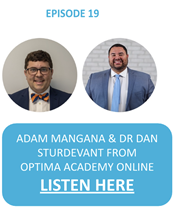
This episode features an interview with Adam Mangana and Dan Sturdevant of Optima Online Academy, the world’s first all-VR school. Optima aims to merge classical education focused on the liberal arts and humanities with cutting-edge virtual reality technology. The school teaches a classical curriculum based on great books and stories to prepare students to be their most human in an age of AI. The founders argue that VR is not bleeding-edge tech but rather the inevitable evolution of technology, just as books were initially criticized yet ultimately transformed learning.
Overall, Optima seeks to leverage the immersive properties of VR to ground students in classical education and culture. As the internet transforms into three dimensions, the school aims to maintain the best of humanities-based learning while expanding access through virtual technology. Dan and Adam argue this fusion will optimize preparation for the future of learning and human-AI collaboration.
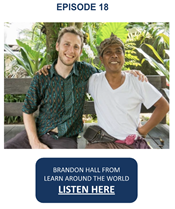
This episode of the Why Distance Learning podcast features an interview with Brandon Hall from Learn Around the World, a content provider that uses live virtual learning to facilitate cross-cultural connections. Brandon discusses the opportunities virtual classrooms provide for cross-cultural communication, and what teachers should keep in mind when facilitating these interactions. He shares his go-to tools for encouraging student engagement and interactivity during lessons. As an educator entrepreneur running Learning Around the World, he talks about the business side of managing a thriving virtual learning program. Brandon’s core message is that distance learning provides awesome opportunities to transform the learning experience when educators fully leverage the available technology.
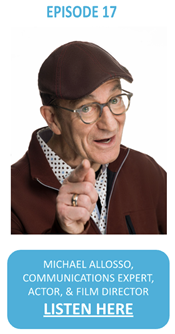
We are excited to welcome master communications expert Michael Allosso to the show. Michael coaches CEOs and executives on dynamic presentations and effective leadership. He's led award-winning workshops worldwide and is a top-rated speaker for Vistage International, winning Speaker of the Year four times. When he's not speaking, Michael is directing plays and films. Michael joins us to discuss the unique challenges and opportunities of virtual teaching. Distance learning exploded out of necessity during the pandemic, but many educators are still figuring out how to maximize its potential. Michael will share his insights on communicating effectively through the screen.
Key Points
Virtual teaching requires adapting your communication style - how to come across as engaging without in-person cues, tips for using body language, eye contact, and vocal variety to connect with remote students. Keeping energy and student participation high during virtual sessions. Portraying enthusiasm and passion through the camera. The importance of entertainment and "golden moments" in education, virtual or in-person. Michael offered great advice for educators on finding their personal brand, the power of making people feel seen, and finding the right roles for people whether it be in the classroom, casting a play, or finding your business’s leadership team. Overall, the episode covered practical tips for impactful virtual teaching while highlighting inspiring teachers using technology to transform learning.
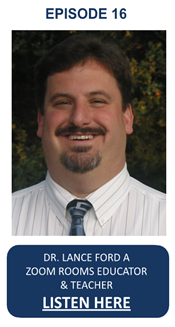
Join us as we speak with Dr. Lance Ford, a veteran educator and pioneer in the field of distance learning. Dr. Ford has been integrating video conferencing technologies into classrooms for over 20 years, and his focus is on how they can enable authentic engagement between teachers and learners, regardless of location.
In this interview, Dr. Ford shares insights from training over 20,000 teachers worldwide on effectively using tools like Zoom. He discusses common misconceptions teachers have before embracing video, as well as the biggest benefits and value-adds they experience after adopting these technologies. Dr. Ford also explores hardware considerations, the nuances of teaching music virtually, overcoming engagement challenges, differentiating instruction, and fostering community in a distance learning environment. He shares creative ideas and "golden moments" that emerge when teachers and students start leveraging the interactive capabilities of video platforms.
This inspiring discussion is a must-listen for any educator who wants to learn more about how to use video conferencing to create effective and engaging virtual learning experiences.
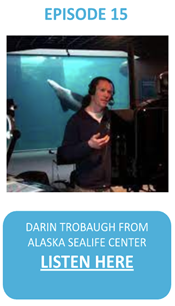
In this episode of Why Distance Learning, hosts Seth, Tami, and Allyson interview Darin Trobaugh, an Education Specialist at the Alaska SeaLife Center. They discuss Darin's diverse background in environmental engineering and teaching, which allows him to bring unique content to each of the over 2,000 educational programs he's taught. Darin shares how he combines his passion for animals with opportunities to share science virtually with learners of all ages. A highlight is Darin's perspective on the importance of using distance learning to share a little piece of Alaska with students who can't visit in person. He touches on how Alaska itself becomes a character in many programs, and the value of teaching Alaskan culture broadly. Darin also discusses benefits and challenges of broadcasting live from the SeaLife Center rather than a studio, including keeping the animals cooperative. Other topics include terminology, designing programs for young learners, and grant funding for distance learning initiatives. Throughout the conversation, Darin emphasizes that distance learning allows the SeaLife Center to fulfill its mission of inspiring conservation of the marine environment in creative new ways.
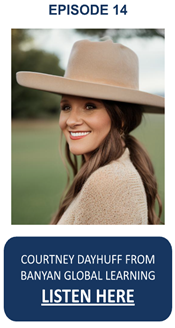
In this podcast episode, hosts Seth Fleischauer, Allyson Mitchell, and Tami Moehring welcome Courtney Dayhuff from Banyan Global Learning. The episode delves into Courtney’s decade of experience teaching over live video and her insights about the power of the medium. Of particular interest is her ability to get students to share their own stories over live video, especially within the context of teaching character education (in this case, SEL, Digital Citizenship, and Global Citizenship). Courtney discusses Banyan’s method of running live virtual field trips from the “real world” with teachers live and on location in real world settings. The discussion also explores the concept of global citizenship in an internet-connected world, along with the benefits of long-term virtual engagements versus one-off sessions. Personal practices for educator character development conclude the enlightening conversation.
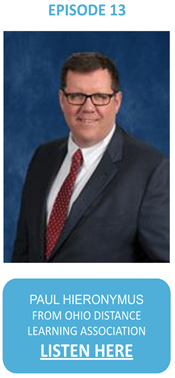
In this episode, Seth, Allyson, and Tami welcome Paul Hieronymus, chairman of the Ohio Distance Learning Association (OhioDLA). We discuss golden moments, the current state of distance learning in Ohio, and persistent challenges in distance learning that may account for why the medium is not more popular than it is. We explore strategies for engaging non-tech-savvy learners and share insights on converting more individuals to this educational approach, emphasizing the pivotal role of Ohio DLA. The conversation touches on ongoing issues in distance learning, post-pandemic enrollment trends, and the virtual vs. in-person schooling debate. Throughout, Paul masterfully underscores the enduring relevance and importance of distance learning in today's educational landscape.
Paul Hieronymus is in his third year of being the chairman of the Ohio Distance Learning Association (OhioDLA). He is one of the founding members of the organization, serving on their board when they formalized as a state chapter of USDLA. Paul is the Director of Information,Technology & Integration for the North Ridgeville City Schools. Prior to OhioDLA and North Ridgeville, Paul has served as president of ISTE’s Special Interest Group for Interactive Video Distance Learning and has served as a core volunteer for ISTE’s National Conference, running video operations from 2008 - 2013. He has been very active with Google Apps for Education and is one of Ohio’s first Google Certified Educators. Since 2004, he has worked with teachers from the US, Canada, the United Kingdom and Australia to establish classroom to classroom collaborations.
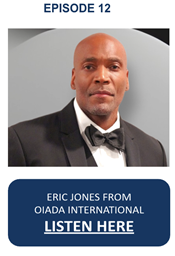
In this captivating episode, Seth, Allyson, and Tami sit down with Eric Jones, a driving force behind Oiada International. With a dynamic career in distance learning that spans decades, Eric’s unwavering commitment to cultivating 21st century global citizens and leaders using distance will leave you awestruck! The group delves into the rich history of Oiada to unpack the best practices for using distance learning to create a successful cultural exchange program that shares perspectives, boosts self-esteem, and instills a sense of unity among global peers. Eric also takes time to share about his time in a leadership role in the United States Distance Learning Association, discussing the challenges USDLA is determined to overcome and the different ways the Association revolutionizes the way students learn!
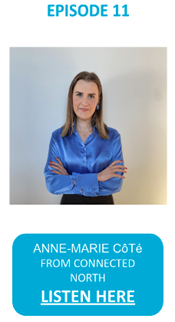
Seth, Allyson, and Tami are joined by Anne-Marie Côté, Content Provider Engagement Coordinator at Connected North. Anne-Marie chats with the group about her work and personal commitment to building engaging and empowering spaces that promotes learning for all. Along with discuss her work in designing K-12 curriculum, she dives into her current role working collaboratively with a variety of Content Providers to develop and/or adapt their virtual field trips to prepare them to effectively connect with remote and Indigenous communities by implementing efficient teaching strategies and appropriate media to engage learners where they are. Anne-Marie, not only shares about her career she also gave us a hot tip about upcoming Distance Learning stars who started their own businesses at the age of 10!
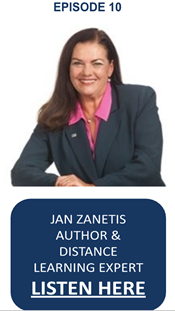
Jan Zanetis is a distance learning pioneer who spent 20 years in K-12 and higher ed before working for Distance Learning powerhouses TANDBERG and Cisco Systems. In 2013, she became the Managing Director at the Center for Interactive Learning and Collaboration (CILC). Jan retired from CILC in 2022 where she mentored co-host Tami Moehring and was a clear and present inspiration to co-host Allyson Mitchell. Due to these close relationships, be forewarned that this episode gets a little sappy! Now freshly retired, Jan - who literally wrote the book (or, rather, several books) on distance learning - drops some extremely practical knowledge about the medium, talks about the power of publishing, and shares her secrets on how to be a successful female leader in a tech world dominated by men.
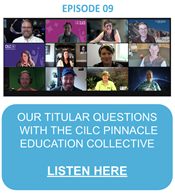
Welcome to Part Two of our exciting two-part episode where Seth, Tami, and Allyson delve into the insights and experiences of a diverse group of distance learning professionals from across North America.
As we do with each episode, we asked each participant the titular question of our podcast: Why Distance Learning? It's a question that distance learning providers have all had to answer, the implication often being: why don't you just do this in person? Each of the people in CILC's Pinnacle Education Collective have reflected deeply upon this question as you will hear in this episode. The answers go way beyond trying to replicate an in-person experience virtually and instead ventures into the medium's ability to push the very limits of what's possible in the classroom.
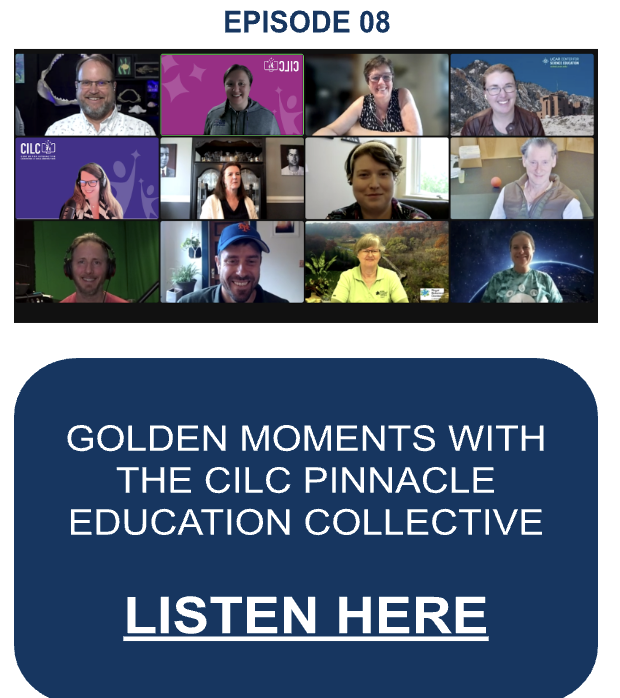
Welcome to Part One of our exciting two-part episode where Seth, Tami, and Allyson delve into the insights and experiences of a diverse group of distance learning professionals from across North America. Reflecting on the golden moments of their careers, our guests share captivating stories that highlight the profound impact they've had on students and, in turn, how the learners have impacted them. Despite the physical distance that separates teacher from learner, these stories highlight the bonds formed through distance learning and remind us of the remarkable connections that can be forged in virtual classrooms.
The crew is thrilled to welcome returning guests and introduce you to new experts with unique perspectives and innovative approaches. Explore the links to learn more about the exceptional institutions our guests represent, uncovering groundbreaking work in distance learning. Stay tuned for Part Two to continue learning from this fun conversation among friends!
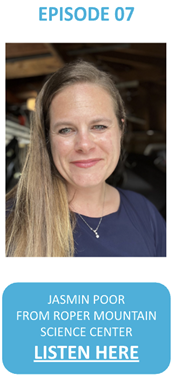
Dr. Jasmin Poor is a decorated veteran of distance learning and brings to the podcast her deep experience with both teaching and research. She discusses with Seth, Allyson, and Tami her perspective on homeschooling and digital school, balancing virtual experiences with on-site visits, the most surprising things she's learned from her research on distance learning, what led her to a career in the field, and why she believes distance learning has great value in today's educational landscape.
Dr. Poor is the virtual field trip teacher and coordinator for Roper Mountain Science Center and her research on the impact of virtual field trips students’ interest in STEM was published in a textbook. She is also an adjunct professor for several universities supporting undergraduates and graduate students in education. Jasmin’s impact on the virtual world includes focusing on creating high quality and engaging programs for students around the world to increase their interest in science.
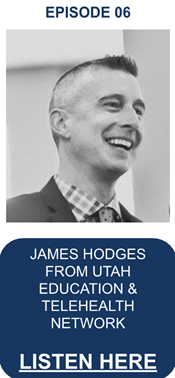
James Hodges joins the crew to discuss his dynamic role as the Interactive Video Conferencing Department Administrator for the Utah Education and Telehealth Network, known as UETN IVC and housed at the Eccles Broadcast Center on the beautiful University of Utah’s campus. Along with giving some great tips about how to jump into Utah living, James explains the unique history and infrastructure that supports the cutting edge UETN Video Operations Center for Utah’s state of the art live, synchronous Distance Education system that is used by thousands of educators and teachers in Utah daily. After describing the impact of Utah’s distance learning model, James also gives insights into his work on the board of the United States Distance Learning Association (USDLA) and its upcoming conference.
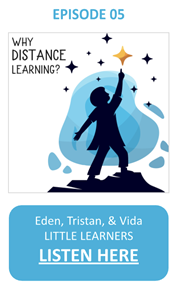
This VERY special episode has Tami, Allyson, and Seth welcoming three real-life littles to the show. Tristan and Eden are two of the most active young members of the CILC community, consistently showing up to Community of Learning events and many other live virtual field trips. Vida is the daughter of host Seth and actually became an impromptu content provider during the pandemic as Banyan Global Learning launched their social and emotional learning program (at the time entitled "Shelter in Place Superheroes") which Vida helped to shape.
With these amazing upper-elementary students (and their parents) we discuss some of the advantages and disadvantages to live distance learning, some of their favorite programs and golden moments, and what they love about distance learning.
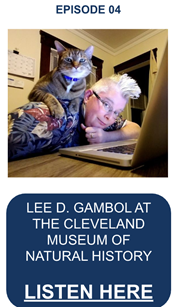
Seth, Allyson, and Tami hang out and talk everything distance learning with health, science, and museum educator Lee Gambol, the Distance Learning Coordinator at the Cleveland Museum of Natural History. Lee and your hosts talk about the current state of virtual learning in their respective states and how school districts that lack bandwidth and tech can get the resources they need to access live virtual field trips. Lee brings her usual charisma to a conversation about using hardware & props, her whacky teaching approach, blending hands-on plus distance learning, customizing content for audiences of all ages, and supporting a team that ensures the same standard no matter who is providing the live virtual visit. Don't miss out on this episode, where you'll not only be inspired by Lee's expertise in distance learning, but also learn some tidbits about how bodies function and hear the crew share some real life scar stories. Get ready for an informative and fun-filled ride!
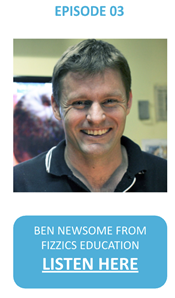
Seth, Allyson, and Tami welcome special guest Ben Newsome, founder of Fizzics Education and Virtual Australia Excursion as well as author of Be Amazing!: the way to teach science the way primary kids love and host of the FizzicsEd Podcast!, to share his extensive experience in creating engaging hands-on science programs using distance learning. Ben provides valuable insights on the power of live virtual programs for learners, especially those living in rural and remote communities in Australia and around the globe. In this episode, Ben also discusses his approach to training energetic science educators to engage a global audience and his work in collaborating with other institutions to create immersive virtual learning events that celebrate special days of observance that relate to science. Tune in to learn from Ben's wealth of experience and learn how distance learning can connect groups globally and break down barriers to education.
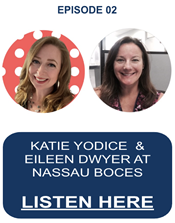
Seth, Allyson, and Tami welcome Katie Yodice and Eileen Dwyer from the Nassau BOCES Center for Online Learning. Katie and Eileen are educational professionals with a plethora of experience running their own unique virtual learning labyrinth for K-12 students. In this episode, they share with our hosts their unique insights for helping educators get comfortable with distance learning and their belief in virtual visits as a critical tool to inject excitement into all types of learning. Of particular interest is their work creating global connections between student groups. Get inspired as you listen to Katie and Eileen explain their role in building a global classroom that gives students the opportunity to explore the world and each other using distance learning.
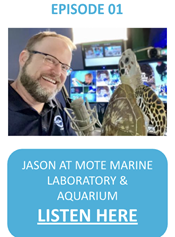
Seth, Tami, and Allyson chat with Jason Robertshaw from Mote Marine Laboratory and Aquarium about his experiences as a virtual educator. The discussion includes a day in the life in the Studio, supporting a range of experts using tech to teach, unlikely hazards using props, distance learning history and culture. They dive into the different ways an educator can get involved in interactive virtual teaching by using their personal expertise and highlighting important content of their institution or field. Also covered are tips and tricks for working with broadcast technologies – including what to do if a raccoon drops through the ceiling right before a live program! Don’t miss this conversation that explores how interactive distance learning experiences open a door to an authentic global classroom for learners of all ages.